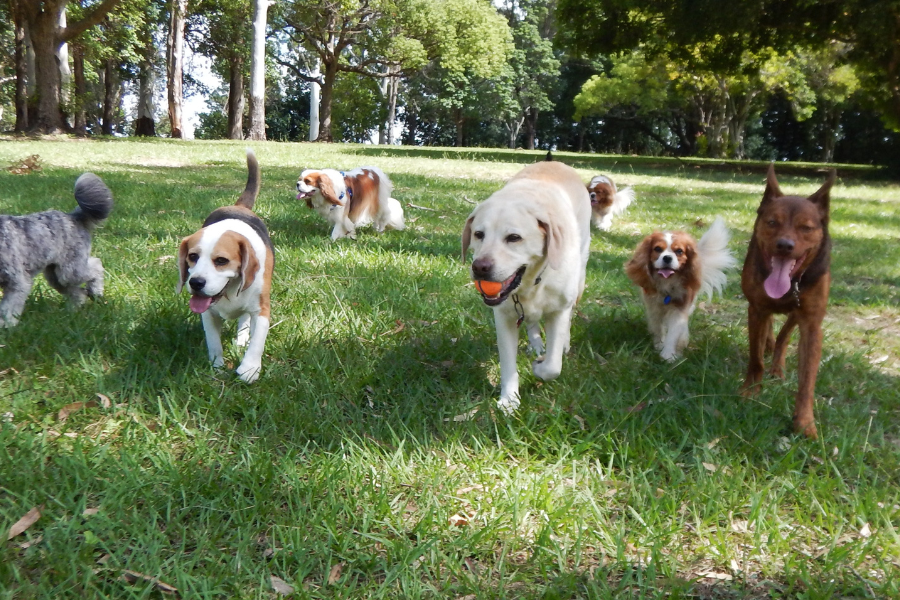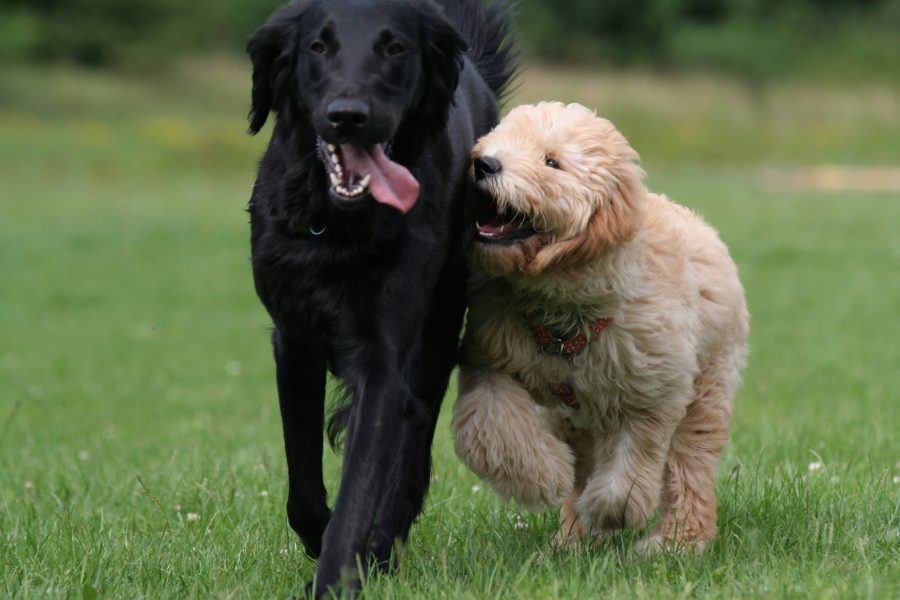Fellow dog people – what is happening!? Have you been considering taking your dog to your local dog park, but find yourself a bit indecisive, or are concerned about the potential risks? Well, in this blog we will be sniffing out both the pros and cons of dog parks. So sit back ,grab a treat (or some kibble), get comfy as we dive into the deets (aka details). It's like deciding whether to add bacon to… well, anything. (Spoiler: Bacon usually wins, but it's good to weigh your options.)
Key Takeaways
- To be or not to be a social butterfly. Dog parks can be a great way to get your dog out there and to be social. Who knows, Bruno could be meet his bff at the dog park. Dog parks are perfect places for dogs to meet and greet other pooches, run wild, and learn to refine their canine etiquette. But for some pups dog parks can be simply overwhelming (like for our Portuguese Water Dog) - so it is important to know and gauge your dog's personality.
- Exercise please: For those of us not blessed with a backyard the size of a football field, dog parks offer a great space for our dogs to stretch their legs, chase balls, and generally burn off more energy than we thought physically possible.
- Health Check: This is an important note. Keeping an eye on vaccinations and health is crucial. Dog parks can be a bit of a germ-sharing fest, sort of like daycare for babies.
- Learn and Grow: Watching dogs interact and play is like Doggy Social Dynamics 101. It's a learning curve for us too, picking up on dog body language and behavior. It’s not just our dogs who make new friends!
- Safety First: Just as we teach kids to play nice, sometimes we need to step in and ensure our dogs are playing safe. Not every dog (or owner) at the park is going to be a model of good behavior, so keep that leash handy just in case.
The Bark-tastic Benefits of Dog Parks
Get social: Dog parks are the social media platforms of the canine world—minus the screen time and with way more sniffing. For our furry friends, socialization is as crucial as your morning latte is to you. It teaches them the intricate dance of doggie manners, ensuring they don't turn into the awkward guest at the pet party who drinks alone by the water bowl.
Exercise on fleek: If you've found your furball channeling their inner couch potato, dog parks offer a fantastic way to get those paws moving. It's the ultimate pup workout—running, jumping, and playing fetch can tire out even the most energetic of dogs, guaranteed to earn you a quiet evening with a pooped pooch.
No leash, no prob: At a dog park, the "no leash" rule is the equivalent of walking around the house in your undies—absolute freedom. It allows your dog to explore, exercise, and socialize without the physical restrictions of a leash, helping them feel more independent, confident, and downright happy.
A happy human: Yes, your dog's happiness is paramount, but what about yours? Dog parks are great places to meet like-minded individuals who love talking about dogs as much as you do. It's a community where "Did you see that cute thing my dog just did?" is always a conversation starter.
The Ruff Side of Dog Parks
Bully in the Yard
Just like in human playgrounds, sometimes there's a bully in the yard. Not all dogs (or their owners) play nice. Skirmishes can happen, and without proper supervision, things can go from playful to rough faster than you can say "treat."
Health Hazards
Sharing is caring, except when it comes to germs. With so many dogs in one spot, dog parks can be hotbeds for spreading diseases and parasites. Regular vet check-ups and vaccinations are a must if the dog park is going to be a part of your routine.
The "Germy" Side of Playtime
Now, don't freak out, but when we're talking about germs and diseases, dog parks can be a bit of a party hub. It's not all bad news, but it's good to be clued up. Firstly, we've got the infamous Kennel Cough, a bit like the common cold but for dogs, highly contagious and not a ton of fun. Then there's Canine Parvovirus, which is seriously nasty and something you definitely want to vaccinate against. Giardia is another uninvited guest, a parasite that's easy to pick up in water or from contaminated surfaces. And, of course, nobody wants to bring home Fleas and Ticks, free riders that can cause all sorts of health issues.
Remember, it's not about avoiding the park, but about playing it smart and staying on top of vaccinations, health checks, and good ol’ common sense hygiene practices. Like always having a stash of water for your pooch, avoiding days when the park feels more crowded than a summer festival, and keeping an eagle eye on sniffles, itches, or anything off. Just a bit of prep, and you're good to go!
The great escape: For the Houdinis of the dog world, dog parks can be the perfect stage for an escape act. Not all parks are fully secure, and a poorly timed squirrel sighting can lead to an unplanned adventure. Ensuring your dog responds to recall commands is critical for those "Oh, squirrel!" moments.
Mixed signals: Without a common barking language, misunderstandings can happen - that can lead to aggressive behavior. Dogs communicate differently, and what's playful to one might be intimidating to another, leading to stress or fear. Knowing your dog's body language and comfort levels is key to avoiding these scenarios.
Sniffing Out the Decision
Deciding on the dog park question is a bit like choosing a new show to binge-watch—what works for some may not work for others. It's important to weigh the benefits of socialization and exercise against the potential risks of altercations, health issues, and the odd runaway attempt.
Tips for a Pawsitive Experience
- Know Your Dog: Understanding your dog's personality, likes, and dislikes is the first step to ensuring a positive dog park experience.
- Vaccination Station: Keep up with your dog's shots and check-ups to protect against illnesses.
- Supervised Play: Keep an eye on your furry friend to interpret their interactions and step in when necessary.
- Early Mornings or Late Evenings: These times can be less crowded, making for a more relaxed visit.
Conclusion
Dog parks have both pros and cons, just like a lot of things in life - just like debating whether pineapple should be a pizza topping or no (it does, email us if you disagree). So ultimately, it boils down to you, your comfort level and your dog's personality. Making an informed choice and reviewing all of the information covered in this blog helps both your pup and and you do what is best for you.
Remember, like every human, every dog is unique and has his or her own preferences - some may love the dog park so much that they spring from the couch when you say "park!?", while others might find their bliss in quieter, less crowded spaces (like our curly girl). Whatever you decide, as long as it's made with your dog's happiness and safety in mind, you're on the right track to being the best pet parent on the block!
Now, go forth and explore—or don’t. Either way, your dog thinks you’re awesome, and so do we.
References
1) Maboni G, Seguel M, Lorton A, Berghaus R, Sanchez S. Canine infectious respiratory disease: New insights into the etiology and epidemiology of associated pathogens. PLoS One. 2019 Apr 25;14(4):e0215817. doi: 10.1371/journal.pone.0215817. PMID: 31022218; PMCID: PMC6483346.
2) Shyan MR, Fortune KA, King C. "Bark parks"--a study on interdog aggression in a limited-control environment. J Appl Anim Welf Sci. 2003;6(1):25-32. doi: 10.1207/S15327604JAWS0601_02. PMID: 12795856.



